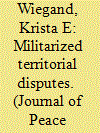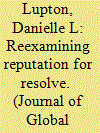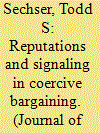|
|
|
Sort Order |
|
|
|
Items / Page
|
|
|
|
|
|
|
| Srl | Item |
| 1 |
ID:
186099


|
|
|
|
|
| Summary/Abstract |
Does wartime debate in democracies during counterinsurgency campaigns embolden insurgent adversaries? Despite the historical frequency of this claim, there is little direct evidence assessing this ‘emboldenment’ hypothesis. This paper develops a novel test of this argument during the US counterinsurgency campaign following the invasion of Iraq in 2003. We find that following spikes in US domestic debate over the Iraq war, there is no evidence that insurgent attacks on military or civilian targets increased in regions of Iraq with greater access to US news compared to regions with less access. Overall, these results offer no support for the emboldenment claim.
|
|
|
|
|
|
|
|
|
|
|
|
|
|
|
|
| 2 |
ID:
102512


|
|
|
|
|
| Publication |
2011.
|
| Summary/Abstract |
States involved in territorial disputes are more likely initiate militarized interstate disputes to threaten or use force (MIDs) compared to states involved in other types of interstate disputes, when the disputed territory has strategic or ethnic value, and when the opposing states are contiguous, rivals, or have relative power parity. Though useful, these factors are static or rarely change over time, so they cannot explain the timing of an MID in a territorial dispute. It is not clear why a challenger state would threaten or use force at one point in the dispute, but not at another point. This study proposes that challenger states sometimes use MIDs not only to signal resolve to the opposing state in the territorial dispute, but to credibly demonstrate resolve to other adversaries in other disputes - an attempt to transfer reputation for resolve. To tackle the debate about transferability of reputation for resolve, the study empirically analyzes all territorial disputes from 1919 to 1995 and finds support that challenger states are more likely to initiate territorial MIDs as costly signals of resolve and credibility around the same time as another MID with a different adversary. Further analysis indicates that in terms of intensity level, challenger states are more likely to use threats, displays of force, or low intensity uses of force when initiating an MID to signal resolve to other states.
|
|
|
|
|
|
|
|
|
|
|
|
|
|
|
|
| 3 |
ID:
196070


|
|
|
|
|
| Summary/Abstract |
The rationalist bargaining literature explains how public statements and military mobilizations can signal resolve. But recent political psychology scholarship shows how such actions can “provoke” targets, increasing their resolve by arousing emotions among their leaders and public. While rationalist models have largely omitted provocation, psychological approaches have neglected its strategic consequences. We model provocation in bargaining, assuming that a challenger’s signals endogenously increase the target’s resolve. Our model shows that introducing provocation can make signals of resolve more credible precisely because their provocative effects make them more costly to send. Moreover, against the prevailing intuition that provocation uniformly promotes conflict, the information from these signals can mitigate their provocative effects and elicit more generous offers than not signaling. Thus, in contrast to psychological accounts, we show that taking provocative actions can be rational and necessary for reaching peaceful bargains. We illustrate these findings with the 1911 Agadir Crisis.
|
|
|
|
|
|
|
|
|
|
|
|
|
|
|
|
| 4 |
ID:
158994


|
|
|
|
|
| Summary/Abstract |
Scholars remain conflicted over the effects of reputations for resolve on international conflict and which actors acquire these reputations. I address this debate by examining how our measures of resolve, as well as where we look for its effects, influence our conclusions about its impact on international conflict. Using data from the Archigos dataset and the International Crisis Behavior dataset, I perform a semi-parametric Cox survival analysis and directly compare the effects of resolute and irresolute behavior at two distinct levels of analysis: the leader level of analysis and the state level of analysis. My results show that target leaders who employ relatively more violent or more severe major responses to dispute triggers enjoy significantly longer periods of time before being the target of a future dispute initiated by the same challenger leader. While I also find a similar effect for target states that employ relatively more severe responses, the impact of resolute behavior at the state level of analysis does not appear to be as consistently widespread as that of resolute behavior at the leader level of analysis. My findings also show that how scholars choose to measure resolve as a concept can have important implications for their conclusions about its broader effects. Finally, my analyses present evidence that both leaders and states may be capable of acquiring reputations for resolve, opening up interesting avenues of future research.
|
|
|
|
|
|
|
|
|
|
|
|
|
|
|
|
| 5 |
ID:
157900


|
|
|
|
|
| Summary/Abstract |
When do states defend their reputations? States sometimes pay high costs to protect their reputations, but other times willingly tarnish them. What accounts for the difference? This article investigates reputation building in the context of coercive diplomacy. In coercive bargaining, giving in to a challenge can harm one’s reputation. I argue, however, that states value their reputations less—and therefore are more willing to capitulate to coercive threats—when they do not expect future challenges. Using a data set of more than 200 coercive threats, empirical tests find support for this logic. Coercers that are constrained in their ability to initiate future challenges exhibit higher rates of coercive success in the status quo. The results shed light on the causes of reputation-building behavior and add an important element to our understanding of the dynamics of coercive diplomacy.
|
|
|
|
|
|
|
|
|
|
|
|
|
|
|
|
| 6 |
ID:
080893


|
|
|
|
|
| Publication |
2008.
|
| Summary/Abstract |
There is a conceptual gap between causes-of-war research and conflict resolution research. This article introduces a macro-level conceptual framework to facilitate analysis of the outbreak, conduct and resolution of armed conflict within states. Three arguments are advanced, linked to the three questions Why do people start fighting?, Why do people stop fighting? and How can peace be made durable? The first argument is that people take to arms because they have Reasons in the form of grievances and goals, Resources in the form of capabilities and opportunities, and Resolve because they see no alternative to violence in order to address grievances and attain goals. Second, the Triple-R concepts also explain the `outbreak of peace', that is, war termination and peace-building. Third, variations in the dependent variable - different degrees of peace; here termed Triple-M (Mutually Hurting Stalemate, Mutually Enticing Opportunities and Mutually Obtained Rewards) - are explained by changes within those three clusters of explanatory factors
|
|
|
|
|
|
|
|
|
|
|
|
|
|
|
|
|
|
|
|
|